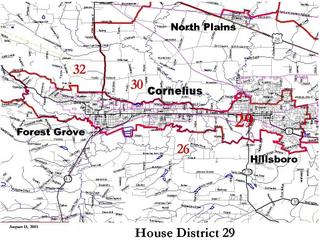(Cross-Posted at
Memento Moron)
I have for some time found myself at a loss as to which modern American political movement closest matches my own beliefs, political views, and philosophies. I understand that it is more and more common, as well as admirable, for individuals to eschew party names or other labels in favor of voting their conscience. While this is an excellent way of applying your beliefs to your voting habits and to choices you make that affect political outcomes, it can become time-consuming in discussions to have to explain just what your beliefs are. Thus, it is often more efficient to identify yourself with a particular party or movement in general, and divulge any variations from that norm only when they are germane to the conversation. This becomes more problematic the more eclectic ones beliefs, I suppose. But I digress. Well, only just a little. The point is that while I find myself agreeing quite frequently with particular parties or movements, there have been numerous occasions where I’ve had to make exceptions to my support or agreement.
Over the course of the last year (wow, I’ve been doing this a year!), while expressing my own views on this blog, I’ve read the comments by my readers, and I’ve read other blogs and the comments by their readers, and in doing so, have learned more about politics and political theories and history than I ever knew before. And while I’m still a novice in such things, I feel confident in saying that I now understand my OWN political views better.
There was a time when I was a staunch modern conservative. This was as a very young person, and was mostly influenced by my family upbringing. During my college and early adult years, I was strongly influenced by opinions and attitudes within the culture of Christian Missionaries, which is what I aspired to be. This led to an odd mix of beliefs all based on what I perceived to be sound biblical doctrine, and I suppose you could say I was socially conservative, fiscally liberal, and a dove with regard to foreign policy. The High Water Mark for my adherence to these positions was in
Churchill’s comment about the effects of age on ones politics certainly rang true in my case, and as time wore on and I began to think out certain positions I held, I grew more hawkish and more fiscally conservative. On social issues, I found myself growing more conservative on some points and more liberal or moderate on others. Eventually I found myself once again firmly in what I believed to be the Republican camp (and, to be honest, that is the way I usually vote), though I found, and find, myself more in agreement with libertarians on some issues.
From there my understanding of my own views evolved to the point where I considered my self a constitutionalist. I believed, and for the most part still believe, that the Constitution was and should be the final benchmark for law in the United States.
But recently I found myself challenged – not to question my belief in the Constitution, but to question its exact place in my political philosophy.
As I mentioned in an essay early on in my blogging days, my political views are still guided by my religious beliefs, as horrifying as that might be to some. The First Amendment was established, I believe, not to prevent an individual’s religious beliefs from having ANY effect on that individual’s political views, but rather to prevent organized religion from dictating public policy, and to prevent government from dictating religious doctrine. Therefore, I reject the Separation of Church and Brain.
This has put me in a dilemma with regards to my stance as a constitutionalist on several occasions, the most notable of which was the Schiavo case. Without launching into a separate debate on the merits of that case, for the purpose of THIS discussion, it must suffice that I believed I was helping to defend an innocent life in taking the stand I did on that occasion. In doing so, and in actively following the blogosphere’s discussion of the case, I was challenged by a post by Naked Villainy’s Smallholder, questioning the depth of commitment to the Constitution of Republican congressmen who were interfering in the case; and the depth of commitment to the Constitution of conservatives in general by their approval of these actions.
And while I’m not sure he was 100% right (not being as much of an expert in the Constitution as I am a believer), he did have a point, one I had to consider and finally concede, at least on my own behalf. In this case, I had to admit, I was willing to waver in my commitment to the constitution in order to remain firm in my commitment to defending life. I found myself further troubled when confronting the argument that the Federal Government was acting unconstitutionally in waging the Civil War, a war I believe achieved great good. This put me, you can imagine, in the unenviable position of once again needing to readjust exactly how I represented myself politically. Eventually I concluded that I still considered myself a constitutionalist, but what I call a Means Constitutionalist, as opposed to an Ends Constitutionalist. By that, of course, I mean that I believe that adherence to the Constitution is NOT the highest end of American Law, but rather, that the Constitution itself is the greatest means by which we strive to the highest ends of American Law. And what is that highest end?
For a very long time, in fact, ever since the days when I was an anti-abortion socialist-leaning pacifist, I held firm to a belief that in arguing the constitutional merits of any given policy or law, modern politicians were overlooking the importance of the Preamble to the Constitution. It was, and is, my belief that within the Preamble, the framers laid out exactly what end they intended to achieve, and in the rest of the Constitution, expounded on how to achieve it.
These are the ends of Law in the United States, and of the Constitution itself: Union, Justice, Domestic Tranquility, Common Defense, General Welfare, and Liberty. Any law that opposes those ends, whether technically adherent to the rest of the Constitution or not, should be opposed. Any law that promotes those ends, whether technically adherent to the rest of the Constitution or not, should be supported. The former should be rendered unconstitutional as quickly as possible, the latter rendered constitutional. But if the day ever comes when the Constitution ceases to uphold those ends, I will cease to be a constitutionalist. In short, my loyalty to the Constitution and to the United States is conditional upon their loyalty to the principles upon which they were founded.
How can I say such a thing? Sedition! Well, not yet. But sadly, the day may come when my words above would be seditious. So be it. For this belief of mine is based on another set of words that were, when coined, equally seditious. But you just said that the Constitution is the final authority on what the ends of our law are! No, I said that the Constitution, or specifically the Preamble, expresses what those ends ARE, and the rest of the Constitution expounds on how they’re to be achieved, but it is not the final AUTHORITY on what they are. Well, then, what or who is? I am. You are. We all are, individually and collectively.
It’s simple, really. With regards to the end of American government, the Constitution addresses almost all of the most important “5W/H” questions:
Who? We the People of the United States
What?in Order to form a more perfect Union, establish Justice, insure domestic Tranquility, provide for the common defence, promote the general Welfare, and secure the Blessings of Liberty to ourselves and our Posterity,
Where?
Philadelphia
When?done in Convention by the Unanimous Consent of the States present the Seventeenth Day of September in the Year of our Lord one thousand seven hundred and Eighty seven
How?do ordain and establish this Constitution for the United States of America.
Notice the glaring omission?
Why?At first blush, I thought that that was what the preamble was about. But I came to believe that the preamble explains WHAT we are setting out to do. But why do we want to form this more perfect union? Why bother creating this finely crafted, well-thought out document?
I finally concluded that the reason WHY, the authority and motivation behind the Constitution, could be found in a document several years older than the Constitution. And I have come to view THIS document as the authority on which rests the constitution. Of course, I am referring to the Declaration of Independence. Specifically, I believe the foundational concept, the authority upon which rests the entire US Constitution and government, is expressed in the following clause from the Declaration:
We hold these truths to be self-evident, that all men are created equal, that they are endowed by their Creator with certain unalienable Rights, that among these are Life, Liberty and the pursuit of Happiness. --That to secure these rights, Governments are instituted among Men, deriving their just powers from the consent of the governed......That’s it. That’s why we have a constitution, why we have THIS constitution. And the rest of that clause goes on to explain why I think it right and proper and altogether fitting to hold to the position I do, which is that I am a constitutionalist only as long as the Constitution achieves this end. Because I believe…
...That whenever any Form of Government becomes destructive of these ends, it is the Right of the People to alter or to abolish it, and to institute new Government, laying its foundation on such principles and organizing its powers in such form, as to them shall seem most likely to effect their Safety and Happiness.


 basis, and rumor has it that Cox has matured and has learned a lesson.
basis, and rumor has it that Cox has matured and has learned a lesson.

